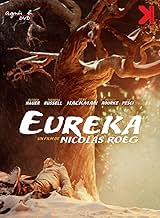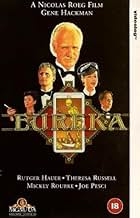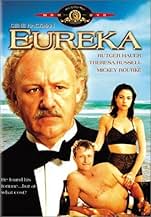IMDb-BEWERTUNG
5,9/10
4271
IHRE BEWERTUNG
Füge eine Handlung in deiner Sprache hinzuIn 1925, a lone and obsessed Arctic prospector Jack McCann finally strikes gold. Twenty years later, he begins spiraling out of control when his only daughter becomes engaged to a man he str... Alles lesenIn 1925, a lone and obsessed Arctic prospector Jack McCann finally strikes gold. Twenty years later, he begins spiraling out of control when his only daughter becomes engaged to a man he strongly dislikes.In 1925, a lone and obsessed Arctic prospector Jack McCann finally strikes gold. Twenty years later, he begins spiraling out of control when his only daughter becomes engaged to a man he strongly dislikes.
- Regie
- Drehbuch
- Hauptbesetzung
- Auszeichnungen
- 1 Nominierung insgesamt
Empfohlene Bewertungen
Eureka is an undertaking where the director has a vision and, against all odds, follows it through.The downside was the woeful distribution of the film on completion, resulting in lack of audience participation due to a delayed release and scant showings (it played in just two London cinemas); just goes to show that certain distribution companies are flummoxed when they have a unique picture to promote. Eureka boasts a great across-the-boards cast, with Gene Hackman giving his customary all in a driven and committed performance, ably supported by Theresa Russell, Rutger Hauer, Joe Pesci and in a minor role, Mickey Rourke. Director Roeg's use of locations, his skill in cutting, the harnessing of atmosphere and the adroit use of music add up to an intriguing whole, loosely based on fact. It was made at the start of the 80's after an astonishing run of films by Roeg.
Actually, this is a very quirky film, immersed in other things; in this case it is the Kabbalah. (This is made clear when Rutger Hauer wears a shirt with the Tree of the Kabbalah drawn on the front to a formal dinner in the middle of the film.) I found this release of the film both impressive and a let-down. It is impressive because of its ambition as a film; it is a let-down because (the way it is edited) most sense of "suspense" is replaced by puzzlement; this is The Zohar meeting Hollywood and suffering from the meeting. In the end, I don't feel this movie has any grand message for the world, except perhaps the pointlessness of having so much wealth if you don't do anything with it.
Overall rating: 7 out of 10.
Actually, this is a very quirky film, immersed in other things; in this case it is the Kabbalah. (This is made clear when Rutger Hauer wears a shirt with the Tree of the Kabbalah drawn on the front to a formal dinner in the middle of the film.) I found this release of the film both impressive and a let-down. It is impressive because of its ambition as a film; it is a let-down because (the way it is edited) most sense of "suspense" is replaced by puzzlement; this is The Zohar meeting Hollywood and suffering from the meeting. In the end, I don't feel this movie has any grand message for the world, except perhaps the pointlessness of having so much wealth if you don't do anything with it.
Overall rating: 7 out of 10.
I too first saw this in London when it came out May 1983, at the Screen on the Hill. It was my O-level year, and I was a skinny, awkward 15-year-old, desperately trying to get into my first 18-rated film. It worked. But was it worth it? The film has an extraordinary opening section, as Gene Hackman finds the gold under the snow-encrusted earth, culminating in a spectacular, slow-motion explosion of rock and snow. Set to extracts of Wagner's DAS RHEINGOLD, it's unforgettable, thrilling cinema, and had my jaw dropping into my cappuccino. We also have the sight of a dying, half-frozen man blowing his brains out again and again, bringing to mind the disjointed, hallucinatory quality one recognises from the director of THE MAN WHO FELL TO EARTH and DON'T LOOK NOW. Stunning, disturbing stuff.
Unfortunately the momentum quickly slackens as we cut forwards in time to a rather dull, plodding melodrama about a Kane-like man who in his anguish says, "Once I had it all...now I only have everything." (Coming after the prologue, this also applies to the film itself.) There's some nasty scenes involving voodoo and Rutger Hauer doing something rather strange with a python, some gut-wrenching violence involving a blow-torch and the contents of a pillow, and a soap-opera court-room finale that feels as if it's wandered in from an entirely different film altogether. There are rumours of a different film lurking in this exuberant mess: one of the film's stars has hinted that it was not Roeg's final version that we saw. But I couldn't call this a success. Roeg fans should check it out as an oddity, but be warned: after the brilliant beginning, it's downhill all the way.
Unfortunately the momentum quickly slackens as we cut forwards in time to a rather dull, plodding melodrama about a Kane-like man who in his anguish says, "Once I had it all...now I only have everything." (Coming after the prologue, this also applies to the film itself.) There's some nasty scenes involving voodoo and Rutger Hauer doing something rather strange with a python, some gut-wrenching violence involving a blow-torch and the contents of a pillow, and a soap-opera court-room finale that feels as if it's wandered in from an entirely different film altogether. There are rumours of a different film lurking in this exuberant mess: one of the film's stars has hinted that it was not Roeg's final version that we saw. But I couldn't call this a success. Roeg fans should check it out as an oddity, but be warned: after the brilliant beginning, it's downhill all the way.
I had never heard of Ed Lauter until he died a few months ago, even though I had seen him in a number of movies; he simply hadn't registered in my mind. While watching Nicolas Roeg's "Eureka", I was surprised to see that Lauter co-starred. I had also never heard of Harry Oakes until I read about the movie. The movie had a good plot but seemed as though it could've been shorter. In the end, I think that the main point to derive from the movie is that prestige makes people go crazy. Gene Hackman's character struck gold and it made him rich, causing him to go nuts, and the insanity extends to his acquaintances. As shown in "It's a Mad, Mad, Mad, Mad World" and "The Wolf of Wall Street", people will do anything for money.
Anyway, it's an OK not great movie.
Anyway, it's an OK not great movie.
Rarely has a film had so much potential, that goes unrealized. Gene Hackman and his gold discovery is beautifully photographed, yet so unlikely and unrealistic, that it seems surreal. From the moment things shift to the island, the movie plays like a beautiful montage, with story continuity only an afterthought. It becomes merely a series of images strung together with philosophical messages, huge time jumps, flashbacks, and metaphysical nonsense. Yet, the images of ultra violence, nudity, snow, gold flakes, and the Victorian splendor, will linger long after the movie ends. From that standpoint at least some of "Eureka"s potential is realized, but not enough to grab the greatness that was within grasp. - MERK
Roeg draws on Who Killed Sir Harry Oakes, as well as Skakespeares tempest and some Robert Service to create this tale of a man who "once had the world, now i just have the everything". a film of thems and more subplots than plot-and many themes. hackmann is a perfect Roeg actor-like Sutherland, Fox and Bowie, but some other performances are not as comfortable, or not as well written -particularly the women. A film that is worth repeated viewing
Wusstest du schon
- WissenswertesDirector Nicolas Roeg has said of this movie: "I was initially interested in a character who wanted to satisfy an all-consuming desire...'that's what I want'...but when he gets it what happens after his brief ecstatic moment? Nothing more than left over life to kill."
- PatzerJack McCann's discovery of the gold is several times said to take place in the winter of 1925. At this time, McCann has no family and is a complete loner. Yet, when the film moves forward to 1945, he has a married daughter who is said to be twenty years old in the early part of 1945. Her mother, McCann's wife, is an aristocratic Englishwoman who has married him for his money, and who therefore cannot have married him before 1926 at the earliest, which makes the daughter unlikely to be more than 18 in the 1945 scenes. Theresa Russell, who plays the daughter, was in her late twenties when the film opened.
- Zitate
Jack McCann: Once I had it all. Now I just have everything.
- Alternative VersionenAlthough the UK cinema version was intact the 1986 Warner video release was missing 7 seconds from the death of Jack McCann, notably shots of a flame thrower being run over his body and face. These were not cut by the BBFC so presumably they were distributor edits. DVD releases are fully uncut.
- VerbindungenFeatured in Loose Talk: Folge #1.7 (1983)
Top-Auswahl
Melde dich zum Bewerten an und greife auf die Watchlist für personalisierte Empfehlungen zu.
- How long is Eureka?Powered by Alexa
Details
- Erscheinungsdatum
- Herkunftsländer
- Offizieller Standort
- Sprache
- Auch bekannt als
- River of Darkness
- Drehorte
- Produktionsfirmen
- Weitere beteiligte Unternehmen bei IMDbPro anzeigen
Box Office
- Bruttoertrag in den USA und Kanada
- 123.572 $
- Weltweiter Bruttoertrag
- 123.572 $
Zu dieser Seite beitragen
Bearbeitung vorschlagen oder fehlenden Inhalt hinzufügen

































